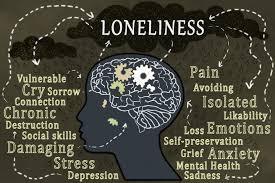Don't wanna be here? Send us removal request.
Text
“Accept the truth that no matter how you are surrounded by people, the end will always be loneliness.”
We all feel lonely from time to time. Feelings of loneliness are personal, so everyone's experience of loneliness will be different. This article discusses what we mean by the term "lonely," as well as the various causes, and potential treatments for loneliness.
loneliness is the feeling we get when our need for rewarding social contact and relationships is not met. But loneliness is not always the same as being alone.
You may choose to be alone and live happily without much contact with other people, while others may find this a lonely experience. Or you may have lots of social contact, or be in a relationship or part of a family, and still feel lonely – especially if you don't feel understood or cared for by the people around you.
“ A reason of loneliness or isolation is when the caterpillar gets its wings. Remember that next time you feel alone.”
Identification of loneliness:
Loneliness can be described in different ways; a commonly used measure of loneliness, the UCLA Loneliness Scale, asks individuals about a range of feelings or deficits of connection, including how often they:
· feel they lack companionship
· feel left out
· feel “in tune” with people around them
· feel outgoing and friendly
· feel there are people they can turn to
Given the potential health consequences for those who feel like they have few or no supportive social connections, widespread loneliness poses a major societal challenge. But it underscores a demand for increased outreach and connection on a personal level, too.
Feeling lonely can also have a negative impact on your mental health, especially if these feelings have lasted a long time.
Causes of Loneliness
Contributing factors to loneliness include situational variables, such as physical isolation, moving to a new location, and divorce. Or even the death of someone can also lead to feelings of loneliness.
For some people, certain life events may mean they feel lonely, such as:
· experiencing a bereavement
· going through a relationship break-up
· retiring and losing the social contact you had at work
· changing jobs and feeling isolated from your co-workers
· Moving to a new area or country without family, friends or community networks.
Additionally, it can be a symptom of a psychological disorder such as depression. Depression often causes people to withdrawal socially, which can lead to isolation. Loneliness leads to low self esteem which results in low confidence.

The impact of loneliness
A number of unfavorable outcomes have been linked to loneliness. In addition to its association with depressive symptoms and other forms of mental illness, loneliness is a risk factor for heart disease, Type 2 diabetes, and arthritis, among other diseases. Lonely people are also twice as likely to develop Alzheimer’s disease, research suggests. The state of chronic loneliness may trigger adverse physiological responses such as the increased production of stress hormones, hinder sleep, and result in weakened immunity. Finally, loneliness has also been shown to increase risk for cardiovascular mortality; individuals who reported often being lonely exhibited significantly greater risk than those who reported never being lonely. A particularly devastating consequence of feeling socially isolated is cognitive decline and dementia.
Tips to Prevent and Overcome Loneliness
Loneliness can be overcome. It does require a conscious effort to make a change. In the long run, making a change can make you happier, healthier, and enable you to impact others around you in a positive way.
Here are some ways to prevent loneliness:
· Consider community service or another activity that you enjoy. These situations present great opportunities to meet people and cultivate new friendships and social interactions.
· Expect the best. Lonely people often expect rejection, so instead, try focusing on positive thoughts and attitudes in your social relationships.
· Focus on developing quality relationships. Seek people who share similar attitudes, interests, and values with you.
· Recognize that loneliness is a sign that something needs to change. Don't expect things to change overnight, but you can start taking steps that will help relieve your feelings of loneliness and build connections that support your well-being.
· Understand the effects of loneliness on your life. There are physical and mental repercussions to loneliness. If you recognize some of these symptoms affecting how you feel, make a conscious effort to combat them.
· Join a group or start your own. For example, you might try creating a Meetup group where people from your area with similar interests can get together. You might also consider taking a class at a community college, joining a book club, or taking an exercise class.
· Strengthen a current relationship. Building new connections is important, but improving your existing relationships can also be a great way to combat loneliness. Try calling a friend or family member you have spoken to in a while.
· Talk to someone you can trust. Reaching out to someone in your life to talk about what you are feeling is important. This can be someone you know such as a family member, but you might also consider talking to your doctor or a therapist. Online therapy can be a great option because it allows you to contact a therapist whenever it is convenient for you.
· Always remember there is a divine force with us. You are never alone. Talk to him. Talk to God. Believe on him.

Conclusion
Some people experience deep and constant feelings of loneliness that come from within and do not disappear, regardless of their social situation or how many friends they have.
There are many reasons people experience this kind of loneliness. You might feel unable to like yourself or to be liked by others, or you may lack self-confidence.
Thinking about what is making you feel lonely may help you find a way of feeling better. See our page of tips to manage loneliness for more information.
0 notes
Text
Revive Yourself
In Bali, Indonesia, we saw lots of advertisements for health spas and salons. By the time we walked back to our room, all the service that we possibly achieved by personal revival were depleted. If you're listening today and you want your tired old self to be revived, you may want to get a nap this afternoon or get an energy drink.
In same manner, Spiritual tiredness can only be revived by the One who is in charge of the resurrection. We are dead spiritually, and unless God makes the first move we cannot make a move towards Him.
Our moves are responses, not determination; and God has just done that. He has come in to rescue us, to resurrect us, make us alive together with His Son, the Lord Jesus. If you do not want to be dead, separated from God for eternity, He can resurrect—revive yourself. And not only a resurrection forever, but the ability to do good works right now, that He has planned for us to do, so that you could really be cause-oriented. If you like these thoughts, let me know and we can continue the dialogue. For better understanding you can connect with a spiritual speaker who can help to revive yourself.
0 notes